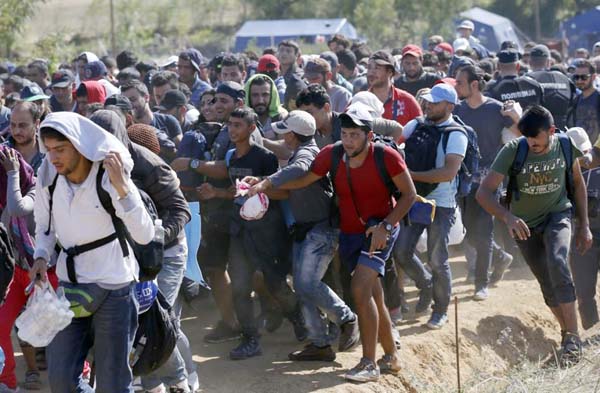
Agencies, Roszke :
A record number of refugees streamed into EU member Hungary from Serbia, police said, just days before Hungary completes a border fence.
A total of 2,093 potential asylum seekers, the highest ever daily total, crossed the border near the Hungarian town of Roszke, a police statement said on Monday.
They were part of a wave of around 7,000 refugees whose journey to the European Union had been blocked last week when Macedonia declared a state of emergency and closed its borders after being overwhelmed by the huge influx of people, amid Europe’s worst refugee crisis since World War II.
Many refugees said they had passed through Serbia after travelling through Macedonia’s border with Greece.
“We were stopped in Macedonia for two days, the riots were terrible, police used guns and tear gas, I saw an old woman beaten, her money and papers taken,” a 29-year-old IT engineer from Mosul in Iraq told the AFP news agency.
Al Jazeera’s Aljosa Milenkovic, reporting from Presevo on the Serbia-Macedonia border, said more refugees were likely to come, “putting to test the region’s ability to cope with the large number of people transiting through”.
The latest movements came as German Chancellor Angela Merkel and French President Fracois Hollande called for a unified system for the right to asylum, and the setting up of reception centres in Greece and Italy.
The issue is set to top the agenda at a summit of Balkan leaders on Thursday, which Merkel will attend.
Hungary has registered more than 100,000 asylum seekers so far in 2015, over double the total for all of last year. In 2012, the figure was just 2,000. The numbers have sharply increased to around 1,500 a day in August, after Hungary’s conservative government announced it would build a razor-wire fence along its southern border with Serbia.
In recent days, refugees have entered Hungary alongside a cross-border train track near Roszke, one of the few sections of the border with Serbia not yet blocked by three rolls of razor-wire, which the government says will completely seal off the border by August 31.
The fence is one of several measures making it more difficult for refugees to enter and stay in Hungary. The government is also tightening asylum laws, introducing penalties for illegal border-crossing, and the planned closure of permanent refugee camps.
About 102,000 “migrants” entered the EU via Macedonia, Serbia, Bosnia and Herzegovina, Albania, Montenegro or Kosovo between January and July this year, versus just 8,000 for the same period in 2014, according to EU border agency Frontex.
The number of refugees now making their way from Greece towards the EU is worrying many EU politicians and has left the Balkan countries struggling to cope with the humanitarian crisis.

